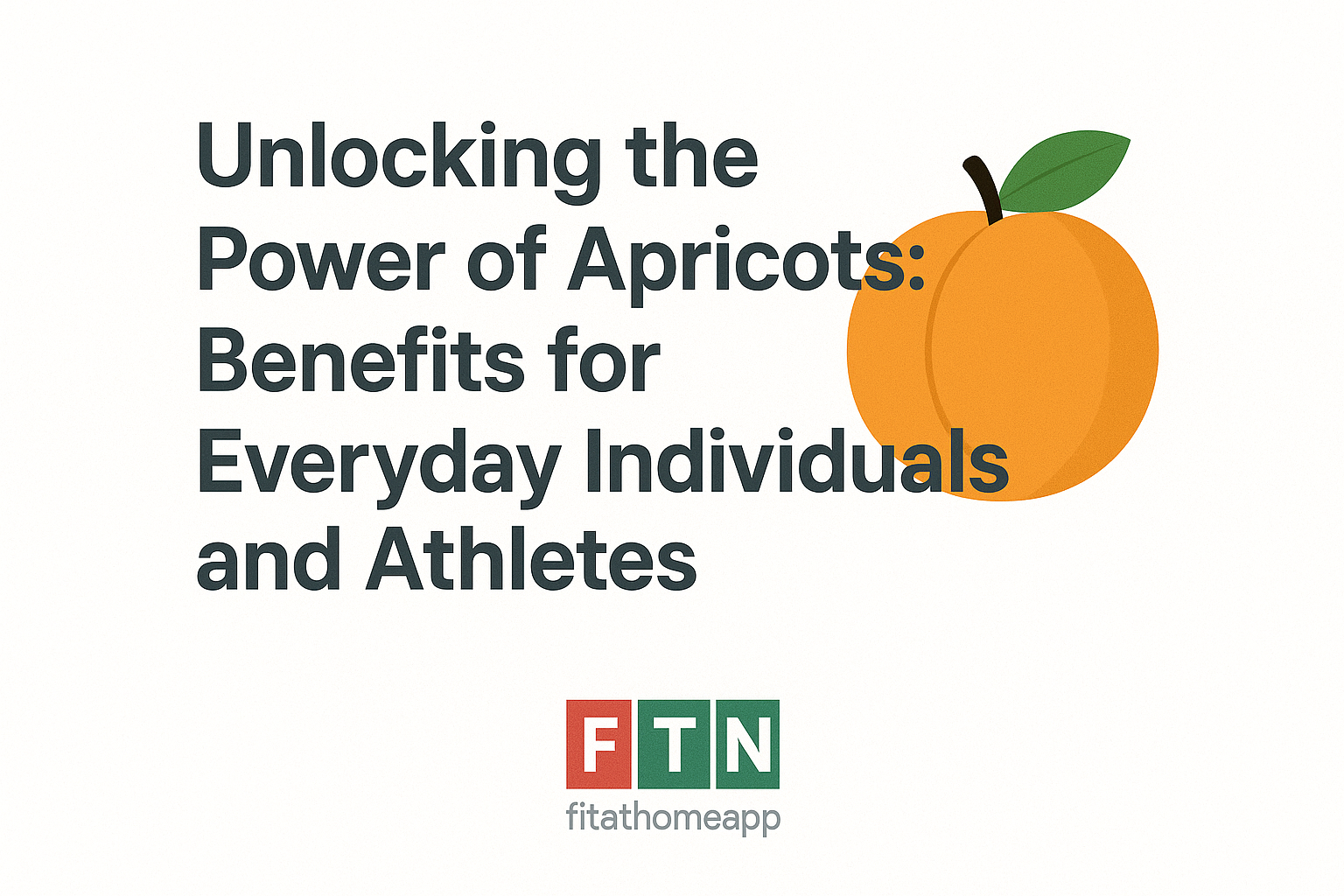Apricots: The Golden Fruit for Health and Performance in 2025 🍑🌞
Introduction: The Nutritional Power of Apricots
Apricots are more than just a sweet, sun-kissed fruit—they are a nutritional powerhouse. With their vibrant orange hue and soft texture, apricots are rich in vitamins, minerals, and antioxidants that promote holistic health. Whether you’re a fitness enthusiast or someone looking to improve your daily nutrition, apricots provide a natural and delicious boost to your well-being.
From vision support to heart health, apricots deliver vital nutrients like vitamin A, vitamin C, potassium, and fiber. These elements not only protect the body from disease but also support active lifestyles. In this article, we’ll explore how apricots enhance general health, boost athletic performance, and can be seamlessly included in everyday meals.
Nutritional Profile of Apricots: Small Fruit, Big Benefits 🧪🍃
Apricots are brimming with essential nutrients that contribute to overall wellness:
- Vitamin A & Beta-Carotene: Apricots are rich in beta-carotene, which converts into vitamin A in the body. This nutrient is essential for maintaining healthy vision, strengthening the immune system, and promoting radiant skin.
- Vitamin C: A potent antioxidant, vitamin C helps repair tissues, supports immune defense, and encourages collagen production for skin elasticity.
- Potassium: Essential for nerve function and muscle contraction, potassium helps maintain electrolyte balance—especially important during physical activity.
- Dietary Fiber: A great source of soluble fiber, apricots support digestive health, regulate blood sugar levels, and help manage appetite.
- Low in Calories: One apricot has just around 17 calories, making it a guilt-free snack that nourishes without excess.
These benefits make apricots an ideal food choice for anyone seeking both flavor and function in their diet.
Health Benefits for Everyone 🌿💪
Apricots contribute to numerous aspects of everyday health:
- Weight Management: Their fiber content promotes a feeling of fullness, which can help reduce overall calorie intake and support healthy weight loss or maintenance.
- Digestive Health: Apricots aid digestion by encouraging regular bowel movements and reducing bloating, thanks to their natural fiber content.
- Heart Health: The combination of fiber, potassium, and antioxidants helps regulate blood pressure and cholesterol levels, reducing the risk of cardiovascular disease.
- Stronger Immunity: With vitamin C and A working together, apricots enhance the immune system, making the body more resilient to illness.
- Skin Health: Antioxidants in apricots, including vitamin E, nourish the skin from within—improving elasticity, hydration, and glow.
By simply adding apricots to your daily routine, you can experience these diverse benefits, improving both internal health and external appearance.
Apricots for Athletes: Fuel, Recovery, and Hydration 🏋️♂️⚡
Athletes need foods that fuel performance, aid recovery, and prevent fatigue. Apricots excel in all three areas:
- Natural Energy Source: Packed with natural sugars and carbohydrates, apricots provide a fast, sustained energy source ideal for workouts.
- Muscle Support: The potassium in apricots helps reduce muscle cramps and ensures proper contraction during physical activity.
- Hydration & Electrolyte Balance: With high water content and essential minerals, apricots help maintain hydration and prevent imbalances.
- Anti-Inflammatory Effects: Antioxidants like beta-carotene combat exercise-induced oxidative stress, speeding up recovery and reducing soreness.
For athletes, integrating apricots into pre- or post-exercise meals can enhance endurance and recovery. Try pairing fresh apricots with a protein source like Greek yogurt or blending them into post-workout smoothies.
Tasty & Healthy: How to Add Apricots to Your Diet 🍽️✨
Getting the most from apricots is easy—and delicious:
- Smoothies: Blend apricots with banana, spinach, almond milk, and protein powder for a refreshing morning drink.
- Salads: Add chopped apricots to green salads with arugula, goat cheese, walnuts, and vinaigrette.
- Grain Bowls: Toss dried apricots into quinoa or couscous with roasted veggies for a savory-sweet meal.
- Snacks: Eat dried apricots with almonds or yogurt for a portable and nutrient-rich snack.
- Baking: Add apricot pieces to muffins, breads, or oatmeal cookies for natural sweetness and texture.
Fresh vs. Dried vs. Canned:
- Fresh: Best for vitamin A and C—ideal for skin and immune support.
- Dried: Great for fiber and potassium, and perfect for on-the-go snacking.
- Canned: Convenient, but choose versions packed in natural juice, not syrup.
With so many ways to enjoy them, apricots make it easy to eat well while satisfying your taste buds.
Potential Allergies and Considerations ⚠️🍑
While apricots are generally safe, here are a few things to watch out for:
- Allergic Reactions: Rare, but possible. Symptoms can include itching, swelling, or digestive upset. If you’re unsure, start with small amounts.
- Sulfites in Dried Apricots: Some dried varieties are treated with preservatives that may cause reactions in sensitive individuals. Opt for unsulfured types when available.
- Fiber Sensitivity: Eating too many apricots too quickly may cause bloating or gas. Gradually increase intake to let your body adjust.
As always, balance and moderation are key to reaping the full benefits of any fruit.
Expert Insights & Scientific Support 🧑⚕️📚
“Apricots offer a wide spectrum of nutrients that support immunity, digestion, and cellular protection. They’re especially beneficial for active individuals.” — Dr. Lena Patel, Clinical Nutritionist
Recent studies highlight apricots’ antioxidant capabilities and their impact on heart health, metabolic function, and exercise recovery. Ongoing research is investigating their potential in reducing inflammation and improving skin health, especially when included in a diet high in colorful fruits.
Conclusion: Make Apricots a Daily Ritual 🌞🥗
Apricots are more than just a seasonal treat—they’re a year-round ally in your wellness journey. Rich in vitamins, minerals, and antioxidants, they support digestion, heart health, skin vitality, and athletic performance. Their versatility in the kitchen means you can enjoy them in smoothies, salads, baked goods, or on their own.
Whether you’re an athlete fueling recovery or someone striving for balanced nutrition, apricots are a delicious and functional choice. Start incorporating them into your meals today, and enjoy the golden benefits of this vibrant fruit.
#EatSmart #ApricotPower #NaturallyHealthy
Personal Insight & Suggestions for Enhancement
My Take:
The video does a stellar job summarizing apricot benefits in a clear and engaging format. It aligns well with your article’s focus on both general health and athletic readiness. Viewers will appreciate its approachable style.
Enhancement Suggestions:
Add Nutrient Callouts: Overlay quick popup tips like:
“High in vitamin A & C for skin & vision”
“Good source of potassium—supports muscle function”
“Low-calorie, high-fiber—great for digestion & fullness”
Include Athletic Applications:
Insert visuals of athletes using apricots—like a runner snacking on dried apricots or an athlete adding them to a post-workout smoothie.
Add a Moderation Tip:
Include a subtle line: “Enjoy in moderation—fresh for vitamin support, dried as a convenient energy snack.”


[…] Power of Stone Fruits: How Cherries and Apricots Boost Health and […]